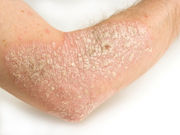Lower education, higher disease visibility, severity, duration, Type D personality tied to stigmatization
WEDNESDAY, July 27, 2016 (HealthDay News) — Sociodemographic, disease-related, and personality variables can predict perceived stigmatization in psoriasis, which occurs in the majority of patients, according to a study published online July 20 in the British Journal of Dermatology.
Sylvia van Beugen, from Leiden University in the Netherlands, and colleagues examined predictor variables for perceived stigmatization in psoriasis in a cross-sectional study. Questionnaires were administered to 514 patients.
The researchers found that 73 percent of patients reported experiencing stigmatization to some degree; correlations were seen for stigmatization with all five categories of predictor variables. In multiple regression analyses, associations were seen between stigmatization and higher impact on daily life; lower education; higher disease visibility, severity, and duration; higher levels of social inhibition; Type D personality; and not having a partner.
“Results indicate that perceived stigmatization is common in psoriasis, and can be predicted by sociodemographic, disease-related, and personality variables,” the authors write. “These predictor variables provide indications on which patients are especially vulnerable regarding perceived stigmatization, which might be used in treatment.”
The study was funded by Pfizer and ZonMw.
Copyright © 2016 HealthDay. All rights reserved.








